Who has never had a cold? Most of us have. We are familiar with the cold symptoms in ourselves. So much so, that you may have found yourself seeing some cold symptoms in your cat and wondering if you were making things up. Does my cat have a cold?
Cat’s can get colds! The common cold is not limited to humans. According to Pet MD, cats can get, “both viral and bacterial sicknesses.” So, if you suspect that your cat has a cold, you may not be making things up!
Another thought you have probably had is, “I just had a cold! Did I give my cold to my cat?” It is very, very, very, rare for humans to pass on the cold to cats. Cats can pass on the cold to other cats. So if your cat has a cold, it is probably from being near another cat who was also sick. They can also get a cold from the virus particles in the air.
But how, then, does a cat not get a cold from your virus particles in the air when you are sick?
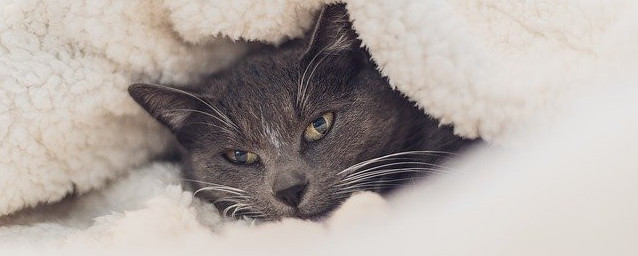
This is because the sickness your cat gets is a different kind than yours. It is called commonly a ‘cold’ or ‘flu’ because the symptoms are close to human symptoms of cold and/or flu. For example, sniffles, runny nose, congested nose, red eyes, watery eyes, body pain, joint pain, to name a few.
The actual scientific name for the cat cold is feline viral upper respiratory disease. Feline viral upper respiratory infection is caused by one of two viruses- feline herpesvirus or feline calicivirus.
These two viruses make up for 90% of all cases. The other 10%, rarely seen, are feline chlamydiosis, mycoplasma and Bordetella.
Important point -> Just as the cold and the flu are rarely serious for humans, the ‘cat cold’ is rarely serious for cats, but needs to be taken care of (as you would take care of a human who has the cold or flu- to keep it from becoming more serious).
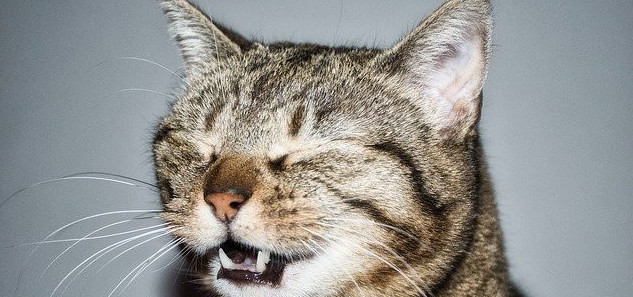
If you are thinking along the lines of a human cold and flu, you would be correct. Just as people with weakened immune systems can be more susceptible to the cold and the flu, so to can cats be vulnerable who have weakened immune systems.
Kittens and the elderly are also more vulnerable, just as babies and our elderly can be more vulnerable.
Some cats are carriers, and may have the illness, but show no symptoms.
Your feline friend can also become ill if they are stressed out- just like humans can.
Cats who are constantly in contact with a lot of other cats- since the virus spreads cat to cat.
Overall, any cat at any age can get a cat cold.
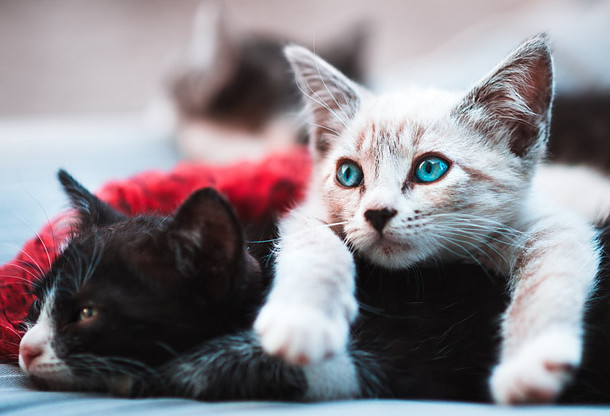
If you are looking to self-diagnose your cat, look for the following symptoms:
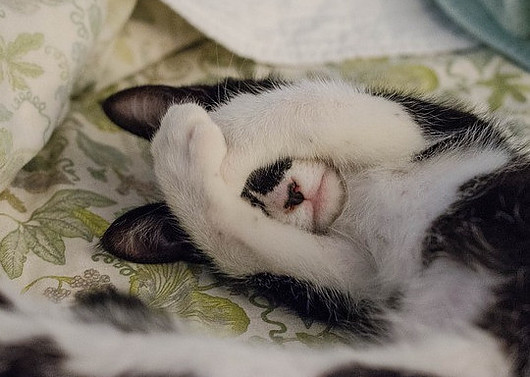
If your cat is sniffing every once in a while, but still eating their food and carrying on with their regular activities, then they are probably okay. Do continue to keep your eye on them. Most respiratory infections in cats will resolve themselves with some love and time.
If your cat is not eating or is having a hard time breathing, then it is definitely time to see a vet! Sometimes a vet’s interaction will be needed to prescribe medications. Othertimes, antibiotics are needed, but often not. Increased eye or nasal discharge, increased lethargy, or a refusal to drink are also key indicators that you need to go on a trip to the vet. Additionally, sore looking eyes that have difficulty closing need to be seen by a vet. One other key indicator is general listlessness and depression.
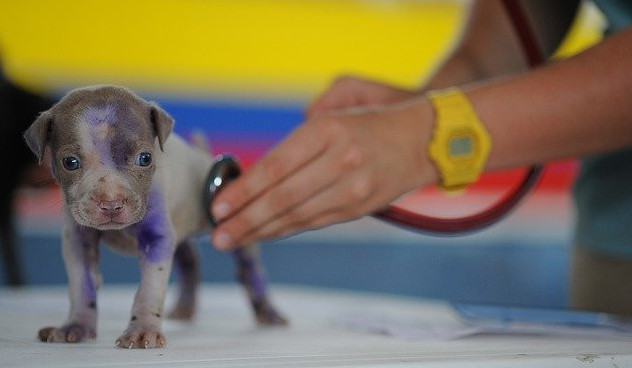
If you are in doubt, it is of course best to be safe and not sorry. Take your cat into the vet and see what they can do for you. Don’t try to take matters into your own hands- if you find yourself looking for medications and fixes for the symptoms your cat is experiencing, it likely means those symptoms have become too severe. Don’t try to handle these yourself. Again, it’s time to see your cat’s veterinarian.
And, of course, giving cat’s medication your would give a human with a cold is not a good idea. Ask your vet about what your cat needs. They most likely need a medication just for cats.
So, you have a cat with a mild upper respiratory infection, experiencing mild symptoms, who just needs some TLC. What next? Send them to bed with a hot water bottle and some cat shows to watch on YouTube?
Of course, firstly you need to keep monitoring your cat for key symptoms. Make sure that their mild symptoms don’t become worse and that new ones are not developing. Especially those serious ones that warrant a trip to the vet right away.

Be mindful of other cats in the house. If you have more than one cat, while nursing one back to health, be sure to keep the other ones from catching the same virus. Keep your sick kitty away from the other ones while they are recovering and away from the neighbour’s cats. Wash your hands before and after helping them, so you don’t transmit their virus to their other cat brothers and sisters.
Your cat will, sadly, need a cat quarantine from other cat members of the household for about 7 -10 days. Make sure they get extra love from you!
Enough with the warnings! What can you do to comfort your cat? No cat parent is happy to see their cat with a cold, but most cat parents find joy in doing the little at home things that bring your cat up to snuff again.
There are a lot of things you can do to show Cat some TLC! And I assure you, they will understand that you are looking out for them 🙂 You can find yourself bonding with your cat through the experience!
If any of these at home remedies cause your cat stress, be sure to stop! Stressing your cat out will not help them to fight the virus. And, remember that it is always best to do these home remedies in consultation with your vet’s advice.
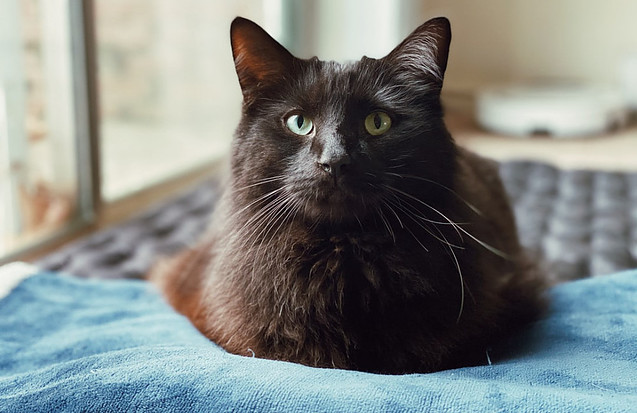
Congestion:
Do: If your cat is congested, have a hot shower and bring them into the bathroom to bask in the steamy, suana-like space. This can help to clear the airways. They only need to be in the room for about 10 minutes. Try parking them by a humidifier for about half an hour, once a day, as long as they are comfortable with this of course! Do this for a couple days. Or, wrap them up in warm cozy blankets. Moreover, you can wrap bags of hot water in blankets to put by your cat.
Do Not: Give them heated beds or heating pads, as these can easily lead to burns on Cat’s sensitive skin or vulnerable paws.
Discharge in eyes and nose:
Do: use clean cloths and saline solution to gently wipe the eyes and nose clean. Alternatively, use a clean, warm, damp washcloth.
Be aware of nutrition:
Since taste buds and smell may be dulled by the cold, warm-up some of your cats favourite nutritious meals like chicken or fish. This may grab your cat’s attention to ensure that they keep eating enough healthy, nutritious food to fight off the virus.
My Cat goes crazy for tuna and chicken! Softer pate cat food can also be a treat! In fact, for sore throats, some softer warm cat food may be the way to go.
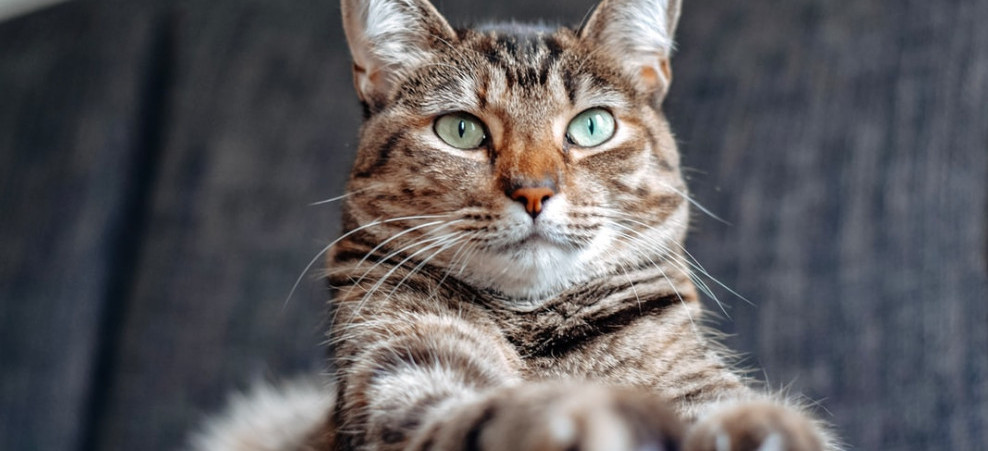
Other ideas are a teaspoon of sardine juice or raw liver. Mmmm. Mmmmmmmm. Who doesn’t want that?
When your cat is well, prevent future sickness by ensuring that they are daily eating healthy foods with everything that they need in them. This will do wonders to keep the immune system functioning well.
More Food Ideas:
Do: warm-up your cat’s food a bit or add some warm water to dry food. This releases those good smells your cat loves in their food and also makes the food easier to eat.
Stress!
Do: Soothe your kitty with some grooming, keeping them away from stressors. (Say, your new small dog that your cat is having a hard time adjusting too).
Don’t forget the power of attention, pets, affirming words, and snuggles!
Hydration:
Hydration is really important. Make sure your cat is getting enough water to drink and not becoming dehydrated. A simple test for hydration levels is to pinch the neck area on the back between the ears and pull it up. (This doesn’t harm your cat; it is where their mother cat carried them as a kitten).
If the skin immediately sinks down and returns to normal, then your cat is hydrated. Hold the flab up for five seconds then release. If the flab of skin remains standing for a second or more, they are dehydrated. Count the seconds. Each second stands for 3- 5% dehydration levels. 5% or more is worthy of a trip to the vet! Further conditions can develop if your cat continues in a state of dehydration!
Dry, chapped nose:
Do: rub a bit of petroleum jelly on that dry, chapped nose!
Bathroom rituals:
Do: make sure that your cat is having no problems in the kitty-litter-box area of life!
Prevent Reinfection:
Do: Keep bedding clean each day! Keep bedding comfy to promote restful and healing sleep and cat-naps! Similarly, keep feeding and drinking bowls clean, cleaning once a day with hot water, to prevent reinfection.
There are, of course, more remedies and things that you can do for your cat. The bottom line is to always take your cat into the vet if the symptoms are anything more than minor, are more than one, or are from the category of ‘take warning’ symptoms mentioned above. You don’t want your cat suffering and your vet has all the experience in the world. Work in consultation with your vet to give the best all-around care and to pick the best home-based remedies for your cat’s specific needs!

Does my cat have a cold? You have wondered. Well, they very well could have a cat-cold. If you have ever suspected a cold in your cat, you could be right! Cat’s cannot give you a cold, and you cannot give one to them, because the sickness are two separate viruses. (But they have the same common ‘cold’ name’). The cat specialty can only be transferred from cat-to-cat.
Common symptoms of a ‘cat cold’ are very similar in nature to ours- coughing, sneezing, runny nose, low energy, to name a few.
It is best to take your cat into the vet if symptoms are ones that require immediate attention. If your cat has more than one symptom, it is also a good time to see the family veterinarian. If symptoms are anything less than mild…I know you don’t want to hear it but I gotta say it… go to the vet! 😉
There are lots of home-remedies for your cat, but make sure these are explored with the consultation and further remedies given to you by your vet.
Any tips on how to take care of your pet cat when they are under the weather? Feel free to share below!
For some more on what to expect when you see your vet, watch the videos below!
Dr Pol
Dr Andrew
I had been wondering what to give my cat to eat with a mild upper respiratory infection. And after trying several things without success, I discovered a couple of meals he did eat.
I gave him some canned/wet food (I found out that the stinkier the better). And he really enjoyed seafood varieties.
Hi Ann! Thanks so much for your response! That is good to hear that wet food works for other pet owners when their cat is sick 🙂 My cat also loves the smelly ones and seafood varieties! Those seem to be a safe bet when you have a sick cat on your hands.